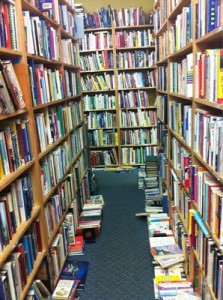 Though West Philadelphia has long been on the forefront of the Philadelphia food justice movement that aims to obtain what we eat from local sources and/or sources that pay the producers fairly, the same cannot be said for what West Philly folks read. In the past three years, West Philadelphians, especially the academic communities of the University of Pennsylvania and Drexel University that have traditionally supported local booksellers, have been steadily and increasingly turning away from them in favor of Amazon.com.
Though West Philadelphia has long been on the forefront of the Philadelphia food justice movement that aims to obtain what we eat from local sources and/or sources that pay the producers fairly, the same cannot be said for what West Philly folks read. In the past three years, West Philadelphians, especially the academic communities of the University of Pennsylvania and Drexel University that have traditionally supported local booksellers, have been steadily and increasingly turning away from them in favor of Amazon.com.
Obviously, we’re not alone. The national market for books has been utterly transformed since Amazon came onto the scene in 1996. According to 2011 research done by Albert Greco, a Fordham University marketing professor who studies book retailing, Amazon has 22.6% of the book market — ahead of Barnes & Noble (17.3%), Borders (8.1%), Books-A-Million (3%) and independents (6%) with the remainder of the market going to various other non-book based retailers including price clubs, supermarkets, and convenience stores.
Full disclosure: I work at a local independent West Philadelphia bookstore, Penn Book Center (not to be confused with the Barnes and Noble, Penn Bookstore). Thanks to Penn and Drexel professors who choose to stock their required course texts at an independent bookstore, each September and January the PBC fills up with student customers excited to purchase their coursebooks. But the store also fills up with other students squatting in the aisles with iPods, droids, laptops, or just pen and paper in hand, with no intention to purchase books, but rather to copy down the ISBN numbers so that they can go purchase the books on Amazon.
The explanation I hear most frequently from these students is that Amazon is simply cheaper, a huge factor especially for students who are demanded to buy large quantities of expensive textbooks. The explanation I hear most often from my friends and peers who opt for Amazon—young professionals who are book lovers of varying levels—is that Amazon is also convenient, allowing exceedingly busy people who can’t make it to a bookstore during business hours to shop efficiently.
The parallel to the local food movement raised at the beginning of this piece becomes relevant here: these are precisely the points of resistance that local food activists face in trying to create and nurture systems of connecting West Philadelphians with locally and fairly grown food. It may be faster, more convenient, and slightly cheaper to buy a burger at McDonalds on 40th & Walnut or Checkers on 48th & Lancaster than it is to buy the necessary component ingredients at Mariposa Food Co-Op (even when subbing tofu or veggie burger for beef), but a growing number of West Philadelphians would agree that it is “worth it” to do so. During my recent new member orientation at Mariposa, I got educated on the historical context of the move towards food cooperatives and the history of West Philly residents’ commitment to food justice. We talked about what it meant to be a co-op member and how it was an investment in the community of West Philadelphia.
Yet, when it comes to books, perhaps many of us know it’s vaguely bad to purchase them from the multinational corporation that is Amazon, but could any of us really articulate why it’s “worth it” to buy books locally?
Here are three big reasons:
1) Amazon is steadily and systematically driving down the cost (read value) of books, a trend that will dramatically affect what books publishers are able to offer us, as readers. Selling books at deeply discounted prices often means that Amazon itself is taking a loss on book sales, figuring it will recoup this money through the sales generated when that book customer becomes an electronics or music or clothing customer. Amazon recently declared they would sell all ebooks for $9.99 regardless of publisher’s costs, effectively setting a hard price ceiling. Says Teresa Nielsen Hayde, an editor at Tor Books (an imprint of Macmillan), this price fixing in print and ebook publishing has taken a “shark-sized bite out of the market for hot new bestsellers, which is trade book publishing’s single most profitable area. That revenue source is what keeps a lot of publishing companies afloat. It provides the liquidity that enables them to buy and publish smaller and less commercially secure titles: odd books, books by unknown writers, books with limited but enthusiastic audiences, et cetera.” The result, she says, is “fewer and less diverse titles overall, published less well than they are now.”
2) Spending money in our local Philadelphia community puts money back into our local economy. No, really. The owners of West Philadelphia bookstores, House of Our Own (Debbie Sanford), The Last Word (Larry Maltz), and Bindlestiffs (Alexis Buss) are all West Philadelphia residents. Penn Book Center owners Michael Rowe and Ashley Montague are Philadelphia residents who employ almost all West Philadelphia staff. Spending a dollar at one of these local stores means they will then spend that dollar at the hardware store, or the grocery store, or on rent to their West Philly landlords, meaning the money changes hands several times within our community before it leaves. A dollar spent at Amazon supports nothing but Amazon.
3) Our local stores can do everything Amazon can do, sometimes for not much more, sometimes for less. Want a good used book of a common title for a class? The Last Word is truly a used book mecca. Want a rare, out of print, or just a not commonly available title? Penn Book Center will order it for you. And just like produce can sometimes be cheaper at Mariposa than at Fresh Grocer (whereas cereal certainly is not), it’s worth thinking critically about the different types of books you’re looking for and where it makes sense to get them from. House of Our Own and Penn Book Center, as they operate on independent business models set by different people with different wisdom, are sometimes able to offer better deals on packaged coursebooks and/or commonly used paperbacks than is Amazon.
As of February 18th, 2012, Mariposa Food Co-op has 1,225 members and counting.
Imagine if 1,225 West Philadelphians joined together in intentional commitment to buying books from local vendors at fair market prices? Imagine what kind of statement that would make about us as a neighborhood, about us as an intellectual community that values the service that print publishing houses provide and the life-changing creative work that writers offer. That’s a community I’d like to live in.
– Emma Eisenberg







February 22nd, 2012 at 1:30 pm
Thanks for the article! Supporting local bookstores is not something I have thought much about, even though I love reading and am a frequent Amazon customer. Anyone interested in more info about this topic, The Colbert Report from Monday, Feb. 20th has an independent book store owner as the guest. Very interesting. I plan to support local bookstores more in the future!
February 22nd, 2012 at 6:09 pm
My new Kindle just arrived today!!!!
February 22nd, 2012 at 9:48 pm
Maybe it’s because Amazon doesn’t look down over their glasses at you while you shop.
February 23rd, 2012 at 12:47 pm
I’m a big fan and user of our local bookstores but I also use Amazon very specifically. You can e-mail them and ask if they have a book: House Of Our Own is hooo@verizon.net, Last Word is philabooks@aol.com, Penn Book Center is info@pennbookcenter.com. Whenever our book group picks a new book I e-mail the used stores first; if they don’t have then depending on my budget I may order it new from Penn Book Center, or if the budget doesn’t cooperate I go to Amazon.Com, but I skip the books coming from or fulfilled by Amazon and go to the Marketplace to order a used book from one of the book stores there. We’ve heard in our travels (always checking out remote book stores in New England) that a lot of these stores get major business via the Amazon Marketplace, and that has helped them stay afloat. And then I turn around and pre-order a new book from Penn Book Center to support them, even if it will cost more, because I really believe they’re so important. I’m no purist, but just do my best to support these great community stores.
February 23rd, 2012 at 1:34 pm
Bindlestiff’s email: info@bindlestiffbooks.com
February 23rd, 2012 at 12:48 pm
P.S to the moderator: I don’t know Bindlestaff’s contact info; you could add that to my note if you want.
February 23rd, 2012 at 2:30 pm
I definitely buy from Last Word and still have not forgotten when I had ordered something online in 2004 without checking who the seller was and found the book with a handwritten note on my doorstep the same afternoon. Why pay to ship it when I was two blocks away?
February 23rd, 2012 at 4:36 pm
I’m glad to see this article that supports local booksellers. Included in the reasons you stated that I prefer local, independent book joints is that it’s human. I can go into Last Word and talk to Larry about a book I’m looking for or read and he can give me some feedback and ideas about other books. I know amazon does this, but I’d much rather have a conversation face-to-face. We all love our little west Philly and our reading habits and reflections sink deeper into the neighborhood when we read together. Finally, Larry used to let me bring my dog into Last Word (when she was still alive), and the experience of hanging in the bookstore with my dog, and observing her interactions with the bookstore cat were invaluable. Can’t do that on amazon….or at B&N!
February 24th, 2012 at 9:31 am
I agree with the notion of buying locally in West Philadelphia and these folks are generally amiable and easy to do business with. However, just because a business is local doesn’t guarantee my loyalty if the people who you deal with are unpleasant or the service is bad. Buying local is the draw that brings me in, excellent attitude and overall pleasantness to your customers is what keeps me coming back in – regardless of what the business is selling.
February 24th, 2012 at 9:43 am
I am a frequent shopper at Last Word. I’m probably in there every week looking for all sorts of books. Let’s be honest though, often times I put down a book because the price is far too excessive for a used book. Several times (once per visit) I have picked up books priced higher than the original prices, returned them and purchased online. If the answer to that is they are classic or hard-to-find editions, well that’s the reason I came to the shop in the first place.
I like the fact that I can usually find a hardcover edition of a book which I prefer. I like the fact that I can wander and linger. The folks there are generally nice-I think one of them used to work at Tower Books when I shopped there. It would be nice if inquiries about books were answered with something other than “I don’t know if we’ll ever get that back again.”
IN my experience, these local shops are great places to discover books. Not a great place to find books you need.
February 24th, 2012 at 3:47 pm
I love books and I used to love the local bookshops. The reality now is that I can download most books on my Kindle in minutes, 24/7 from anywhere. I save lots of physical space in my home. I only buy paper books on rare occasions now, and as e-ink technology improves I’m sure that will become more rare indeed. I’m sorry for the local shops, but I think most bookshop days are numbered.
February 28th, 2012 at 3:09 pm
Thanks to all who read and commented on this story. It’s great to see that West Philly is thinking about these important issues. Also, check out this article below about the abysmal conditions at Amazon’s Lehigh Valley warehouse:
http://www.mcall.com/news/local/amazon/mc-allentown-amazon-complaints-20110917,0,6503103.story